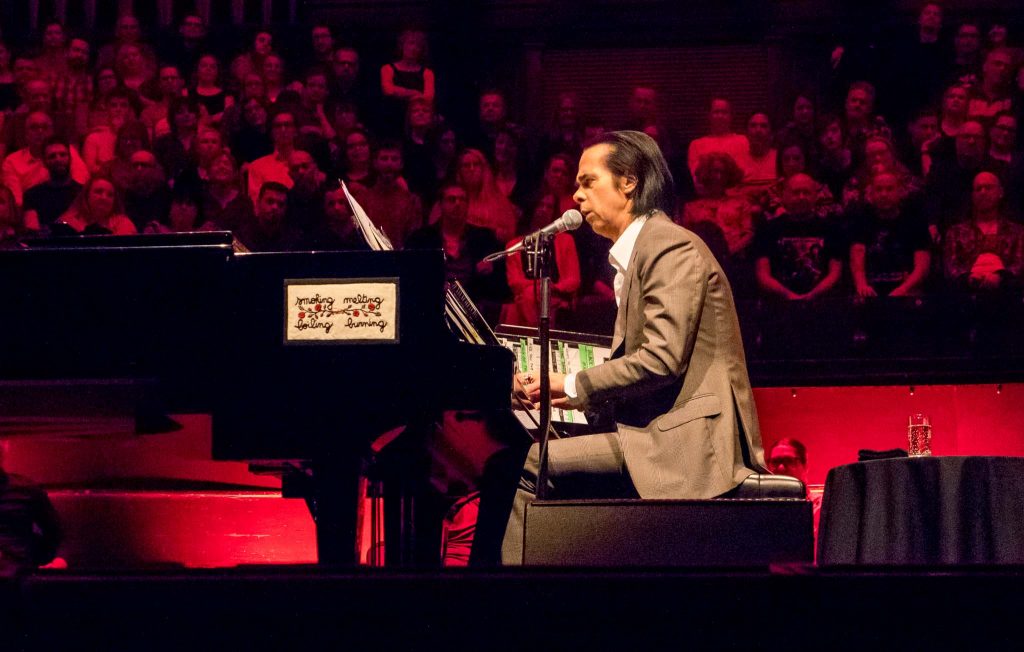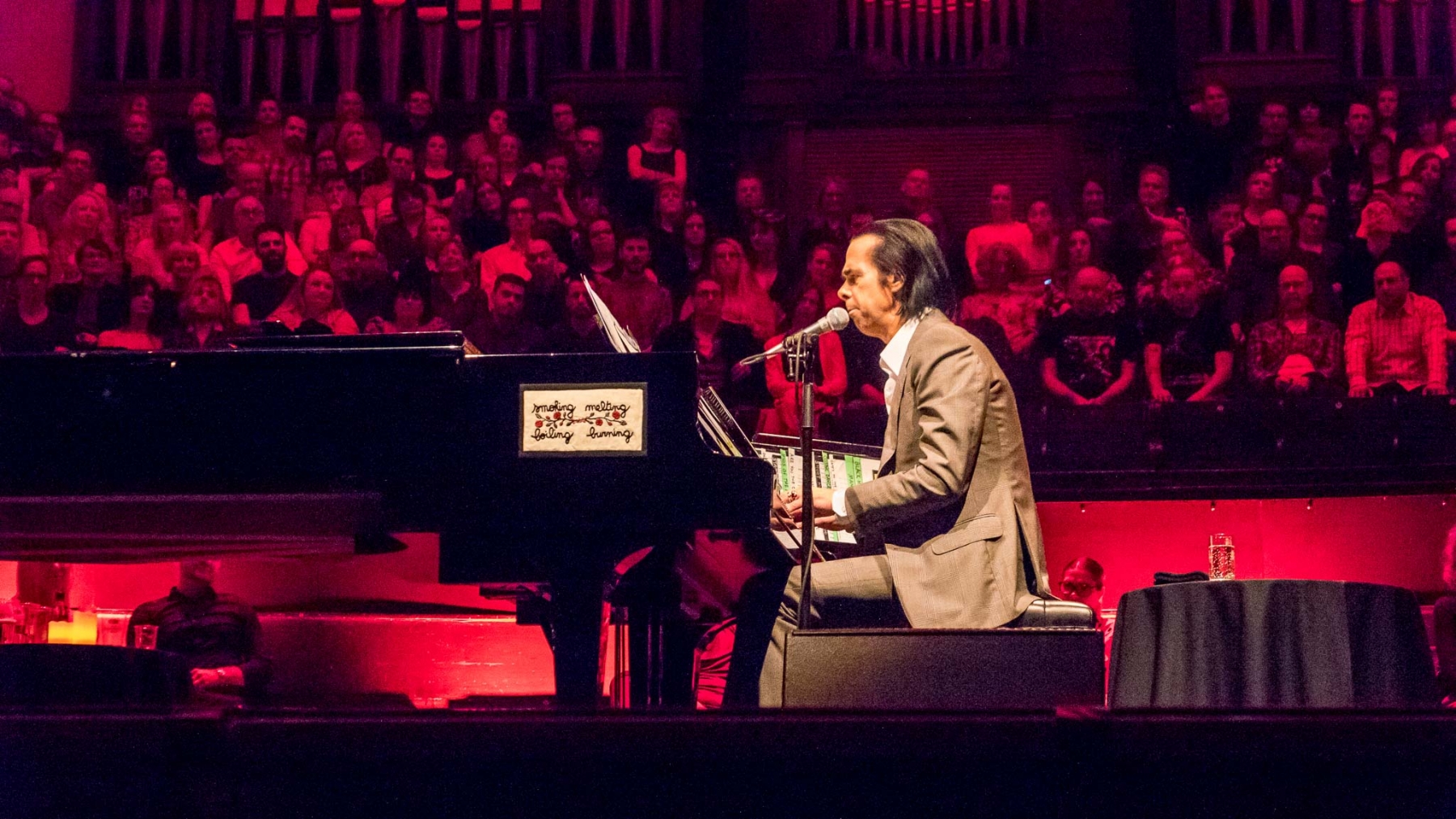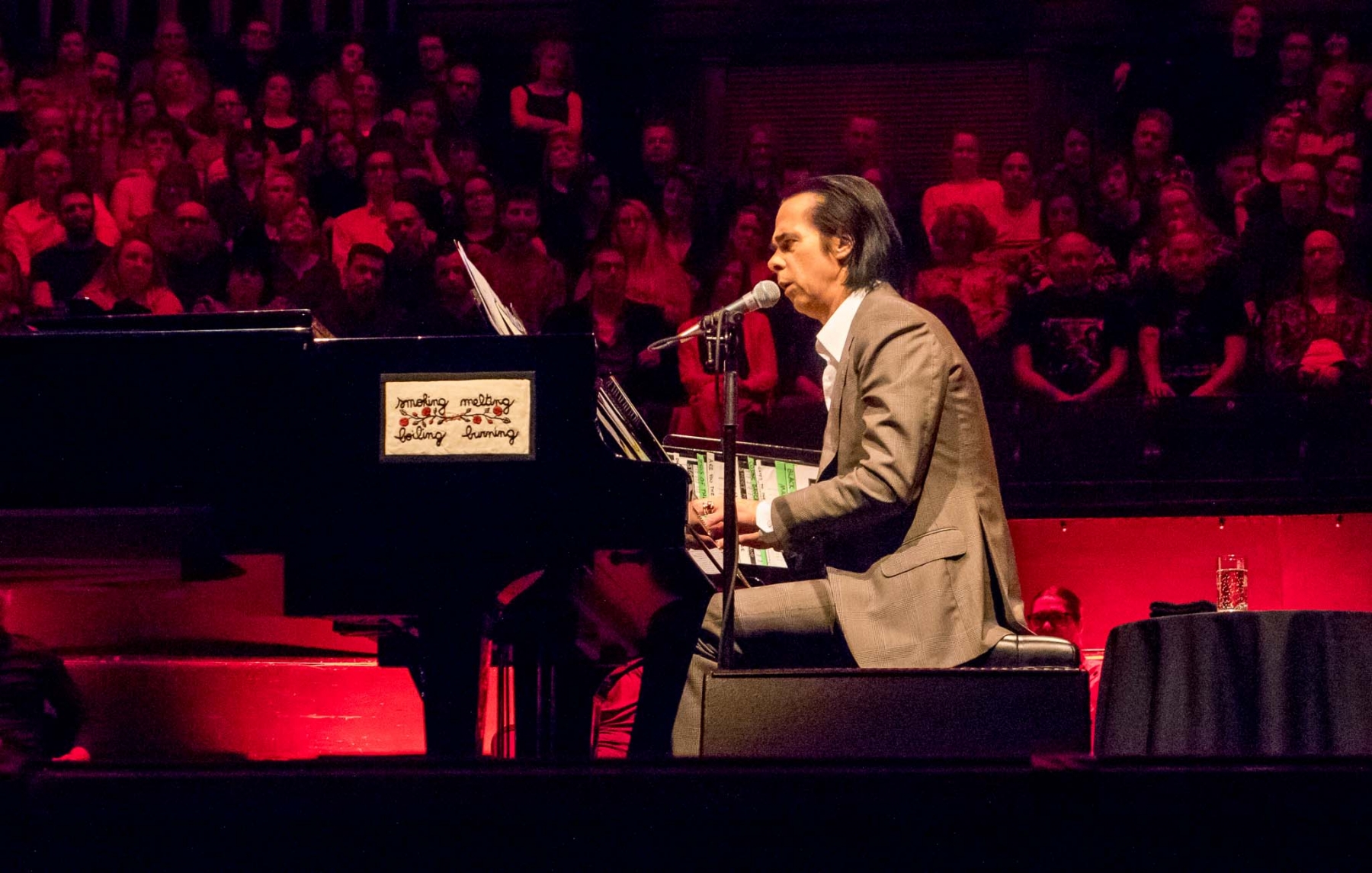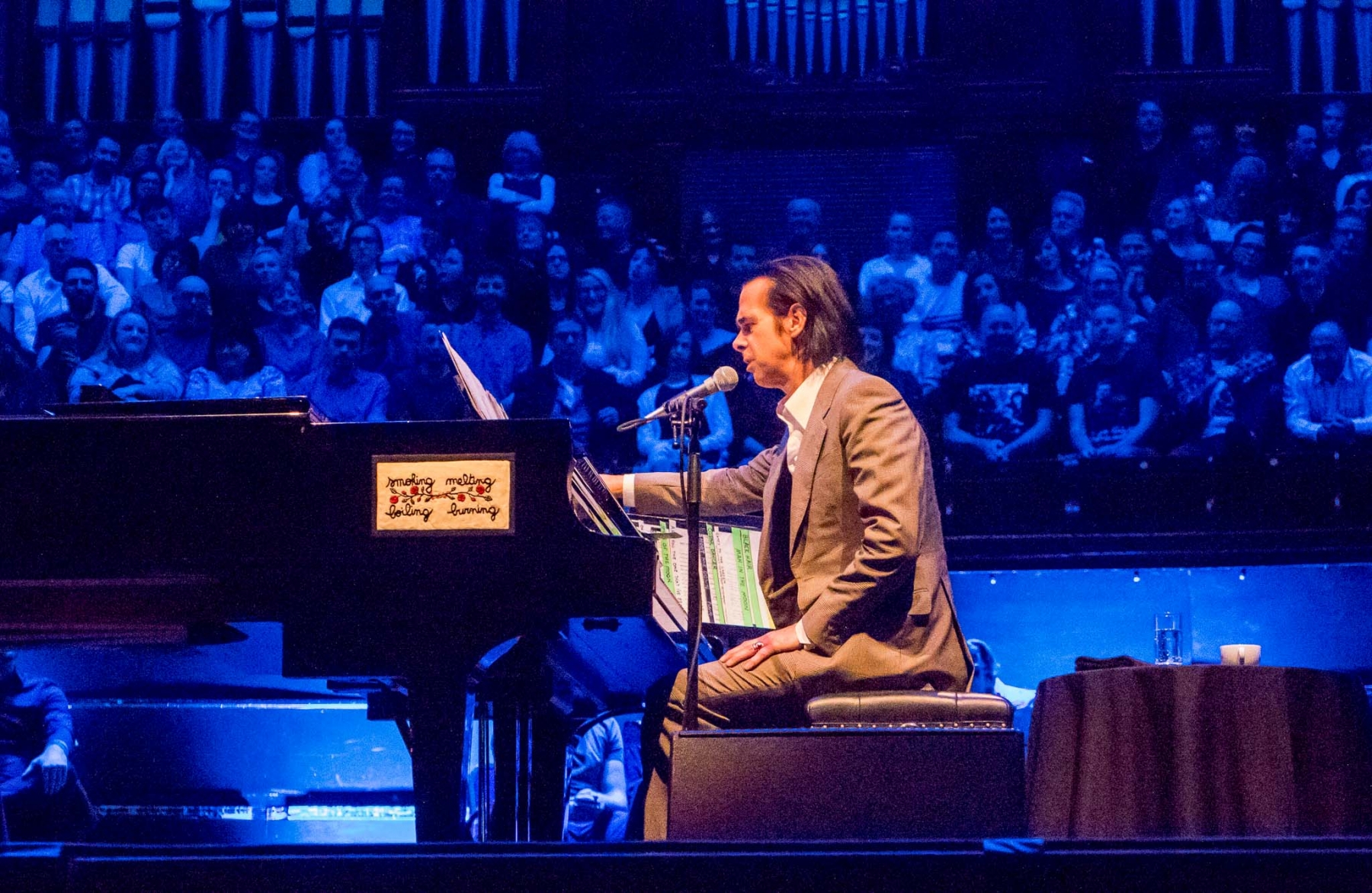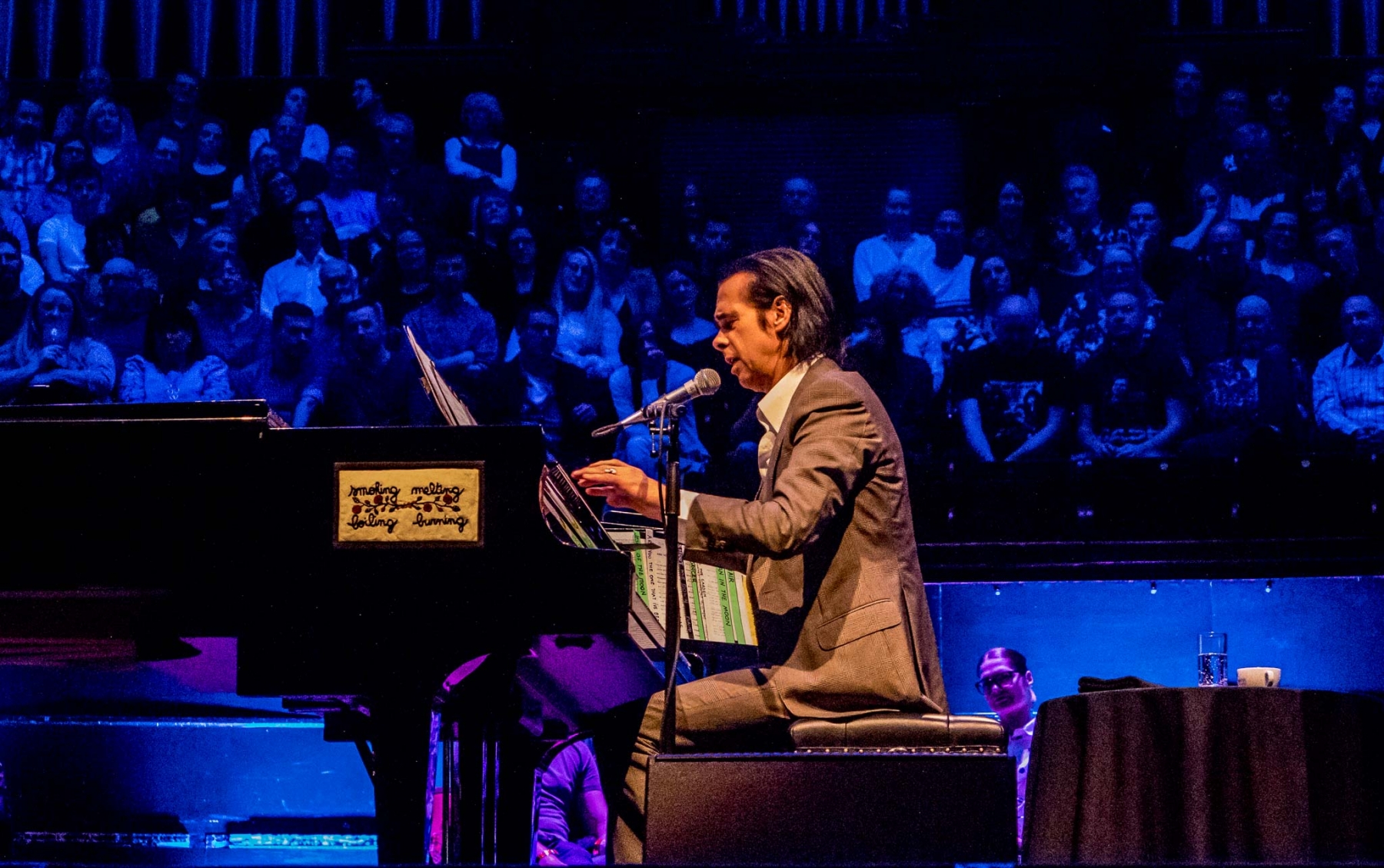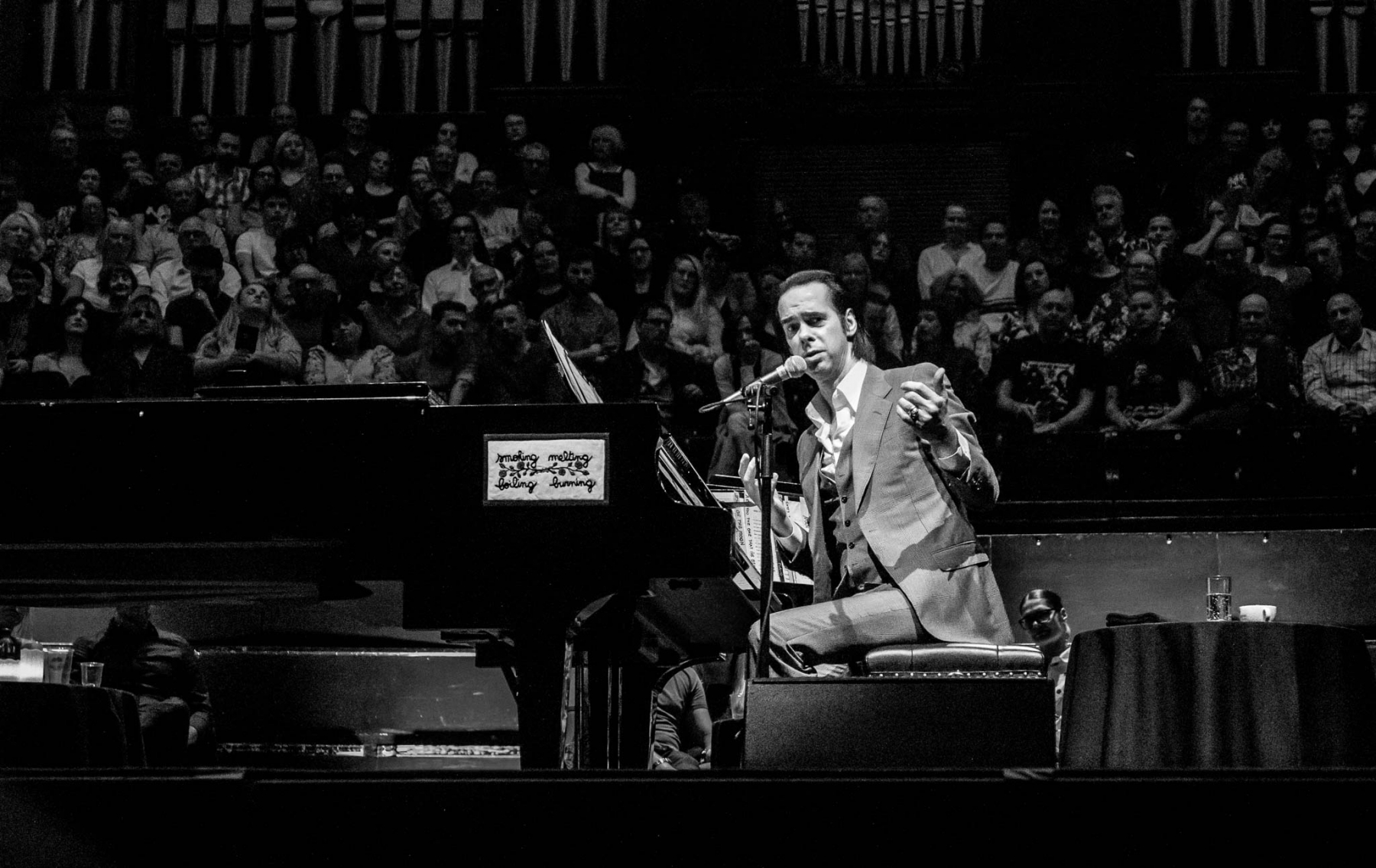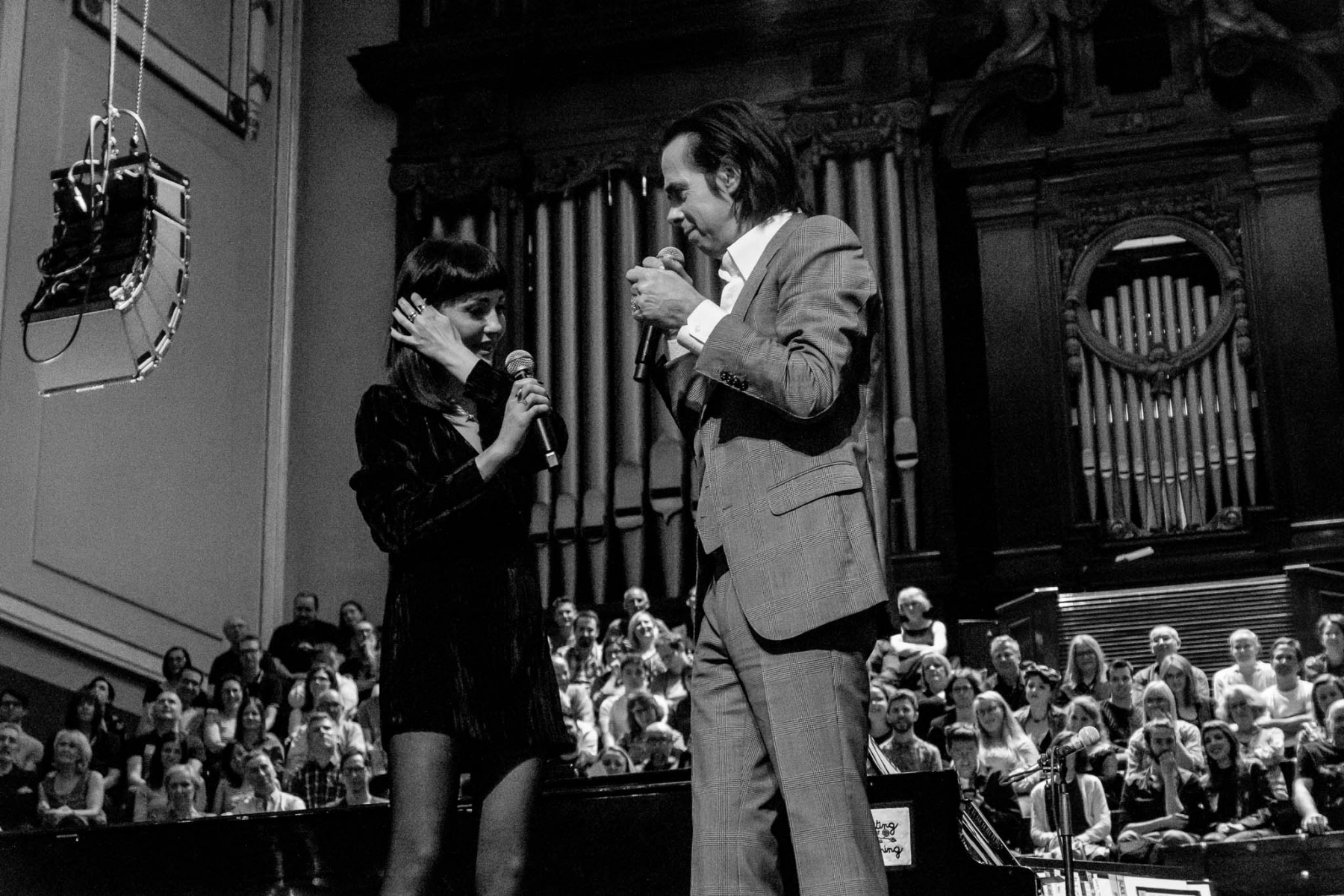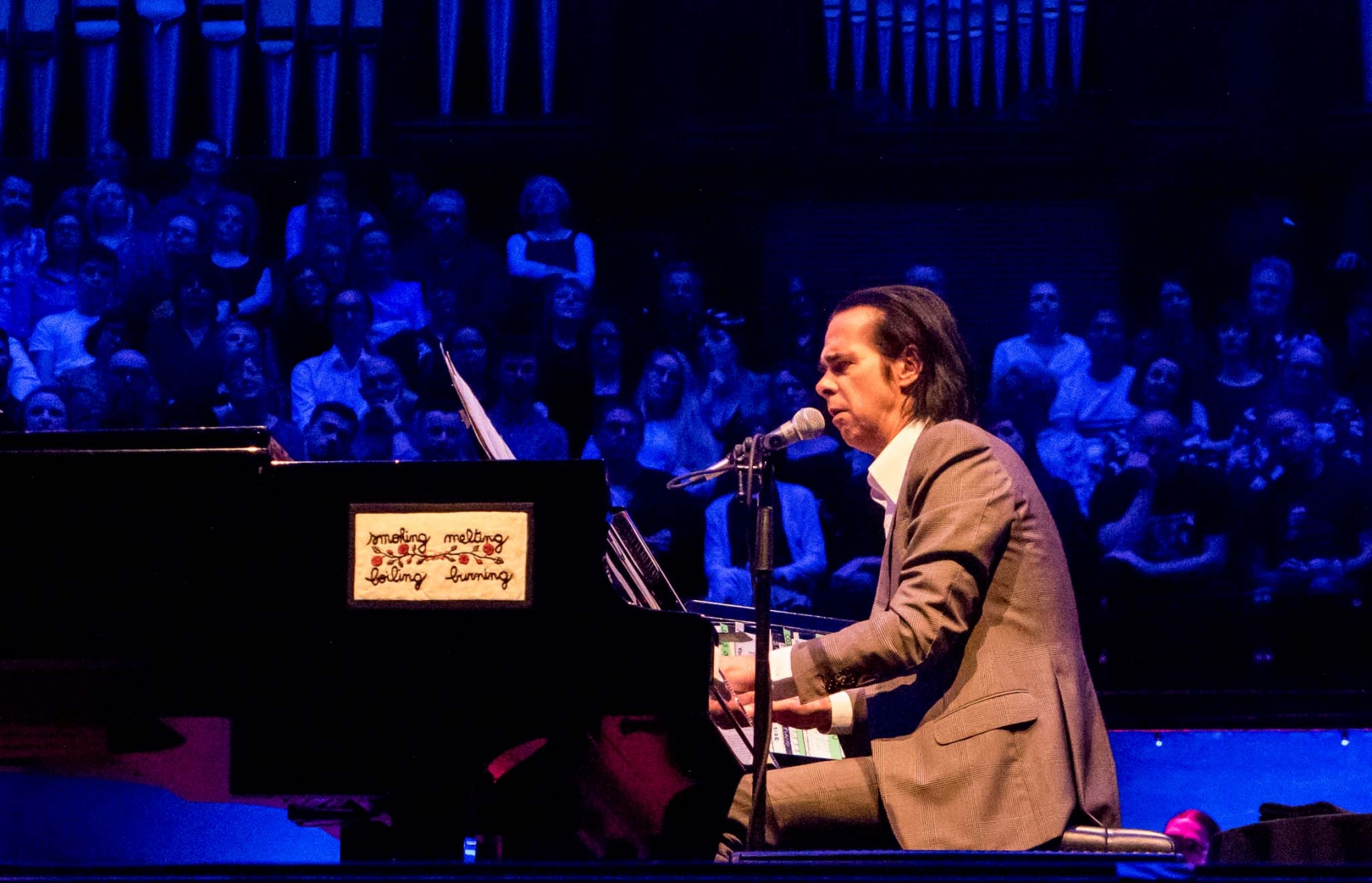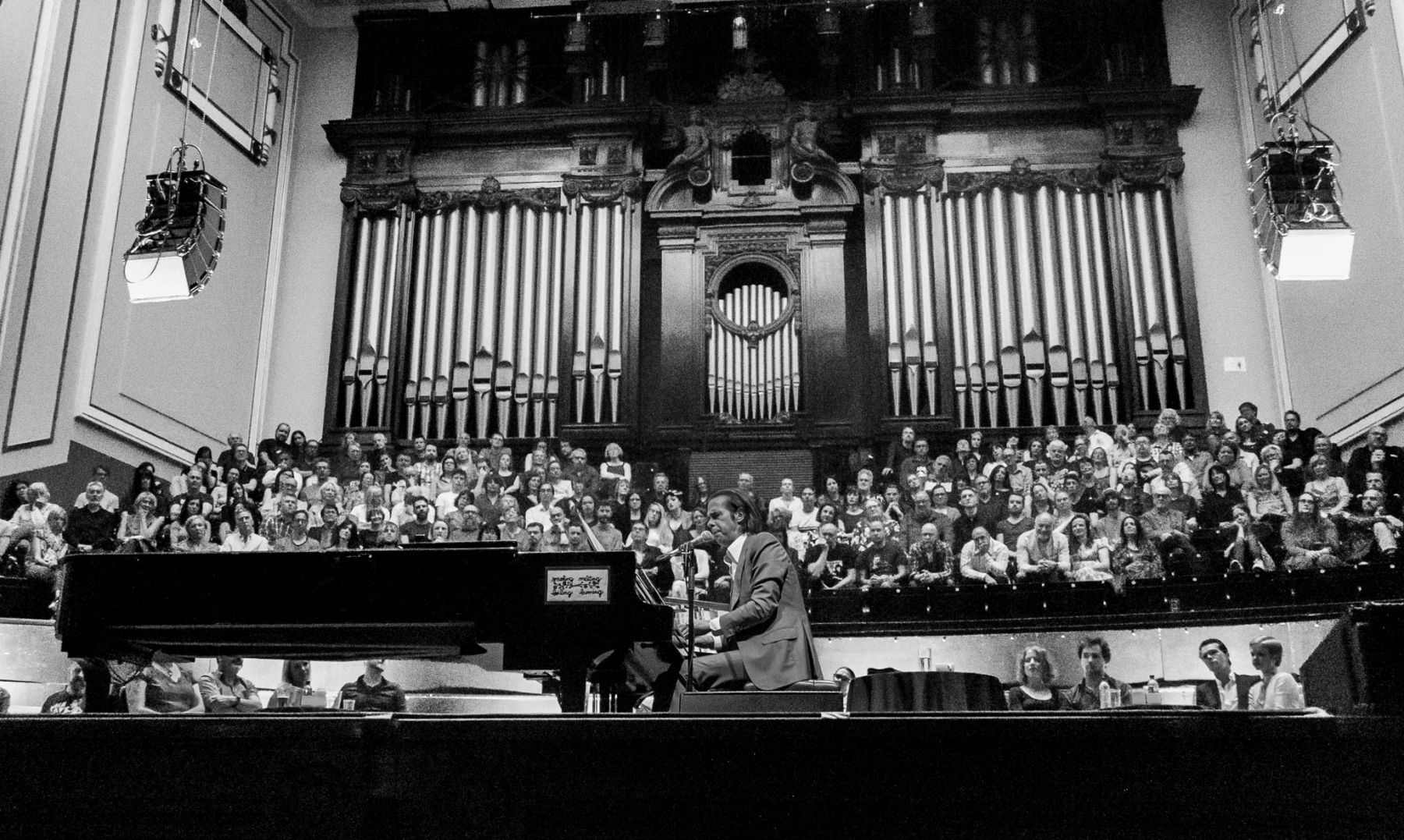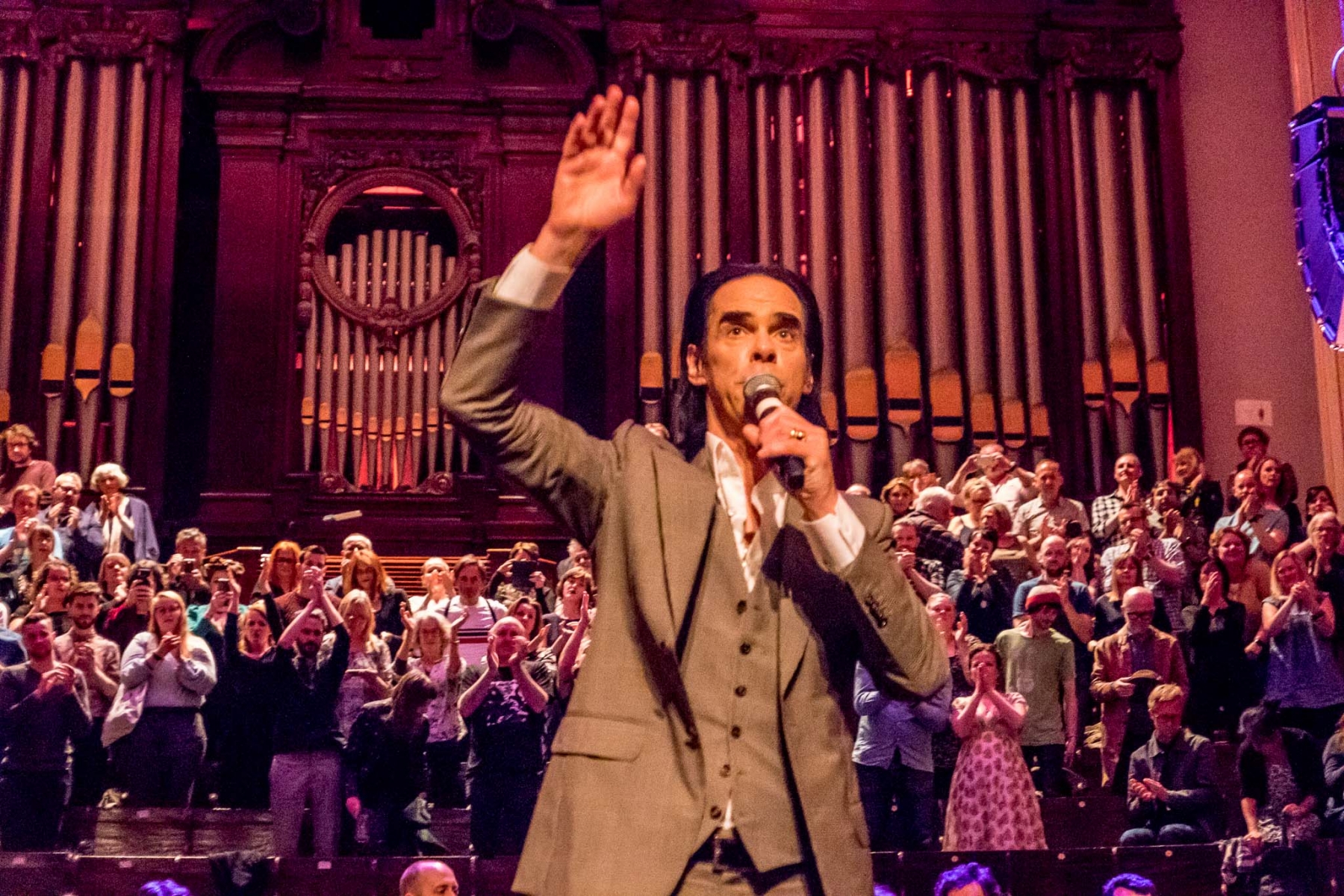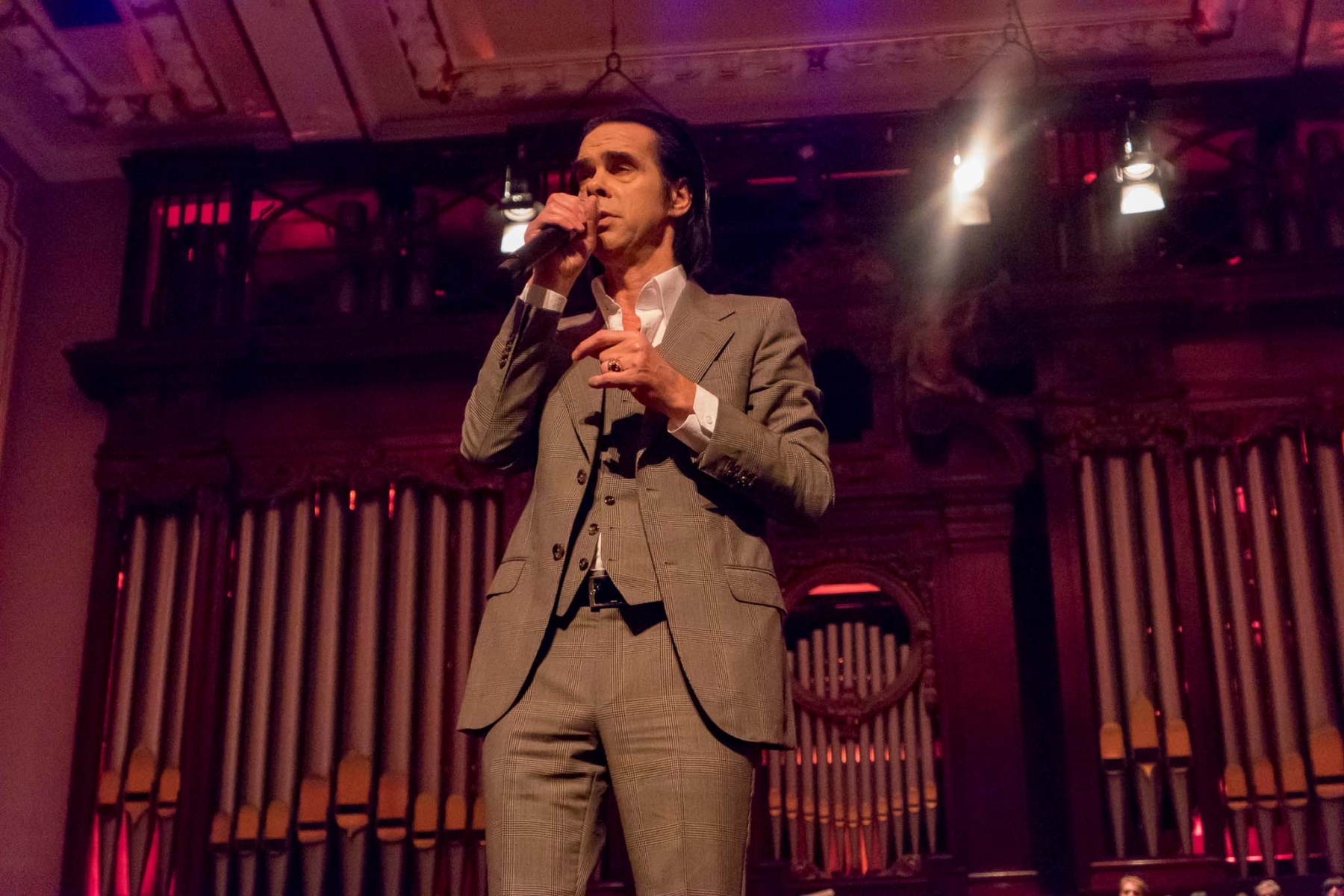Nick Cave continues his journey through life with this stripped back solo tour. This time it involves his audience in a more direct role than normal. These past few years has seen Nick Cave become more accessible with the creation of “The Red Hand Files”,where his fans are encouraged to ask questions and become part of his day to day life as he undertakes to understand both his own journey and those who wish to be involved by sharing theirs. I feel I have been on this journey for as long as I can remember and seen the many guises of Nick Cave, from those chaotic days in The Birthday Party to the current emotive days where the chaos has subsided but been replace by an intensity that is even more exhausting than any physical exertion. Nick Cave and the Bad Seeds gigs are a sight to behold. You really have to be there to understand and to have an opportunity to see and hear what makes Nick Cave ‘tic’ , almost face to face, is always something not to be missed. Of course, with 2,000 in the building, I am not alone but the connection he has with his audience feels special. Enigmatic and resplendent in his suit, Nick Cave strides on stage with a purpose. Hand raised in acknowledgement of the applause, I’d say “rapturous” and that would be a good description as it does feel like a religious experience, certainly spiritual, and the first song he plays is prophetic. The opening chords of “God is in the house” sets the tone for the evening. Nick Cave might not be an actual god but the respect he commands is considerable.
This conversations event is a direct extension of “The Red Hand Files”. Nick asks everyone who subscribes to raise their hands and immediately states “there’s not enough, google it and subscribe to it”. Set up 6 months ago, Nick now gets approx. 100 questions a day. The questions are mostly extraordinarily beautiful but Nick states “The concept of the question is done nowand it’s become a part of his life and he his plugged in to the soul of his audience and it’s a beautiful thing”.The point to this evening, is an unmoderated way for anyone to ask what they like. It is difficult to stand up in front of people, but Nick says “suspend judgement and let’s see what happens”, he asks people not to film or feel the need to put up on the internet so “put your fucking phones away”. Nick asks the crowd to compose themselves, think of questions, the bolder and stranger the better. Nick states “The beauty of all of this is, it started as an exercise and now has become terrifying”. Back at the piano, we get one of his classics. A song of the girl with the crooked smile and a heart shaped face, “West Country Girl”.
We are now in conversation…

First question, “how do you transition from travelling from home to various places all over”. Nick responds quite plainly, when at home he’s with his family full time. He treats each day similarly in that, he gets up in the morning, puts on his suit, kisses his wife goodbye, then walks into his home office. It’s almost the same when he’s away but without the kiss and it’s a hotel room, not his office.
“Do you ever suffer from creative comedown when you finish a book or an album”. Nick responds with “the thing about making a record or a book, you believe this will change the world but the end result is just a lump of plastic then everything is taken away from you so in the end, the game is just to provide material for people”. “The actual creation process is immensely enjoyable”,Nick says he lives for it.
“Who, apart from Leonard Cohen, has influenced you in your life and what’s your thoughts of Boris Johnson”. As Nick tells us, “Well of course, Boris has been a huge influence” Nick says jokingly, but actually, “Alex Harvey was a massive influence, a huge influence, maybe not a morale one but certainly musically”. He tells us his first band was basically a Sensational Alex Harvey tribute band.
After previous asking in Birmingham where the question was “how do you get back your creative flow”, the member of the audience now asks “where do you get your mantra from”. Nick says he feeds from his own songs and he inherently uses a collection of songs to feed from each other, like on the album, “The Skeleton Tree”, Nick says, “there are echoes in each song but ultimately, the message was just to stay alive”.
Next, a man called Peter asks about an interview where (former Bad Seed) BlixaBargeld apparently called Nick the greatest songwriter ever. Nick jokes he must’ve taken a great deal of amphetamines before he said that, and this leads into Nick describing a song where Blixa wrote the music and Anita Lane wrote the words as an examination of Nick and Anita’s sexual relationship. Nick laughs as he tells us he has ended up singing it. It has ironically been quoted as one of his favourite Bad Seeds songs. “Stranger Than Kindness” goes down well with the audience and Nick jumps back up from the piano and into another question.
It’s a question about the Bad Seeds and the revolving entity that the band are, members have come and gone and although Warren Ellis is a now a main stay now of the band, how is Nicks relationship with former stalwart Mick Harvey. Nick tells us they do still meet, Christmas being the last time and they are still friends but the dangerous and corrosive nature of collaborations means that often friendships cannot survive. Nick goes on to say The Bad Seeds are a family, although there are ghosts of previous members, Nick would be happy to work with old members, in fact Blixa nearly worked on “Push the sky away”, but due to illness, it didn’t happen. Nick says, talking of his current and most prolific collaborator, “first and foremost, Warren is a friend and even though they spend time apart, their collaboration is based on their friendship first”. As Nick continues to talk of friendship, he jokes about Bobby Gillespie from Primal Scream and the fact he struggles to understand him. There’s some good banter from the audience and similarly, Nick fails to hear or understand those shouting out.
“What would your advice be for anyone starting out in the music industry now”, as Nick has been around for a long time, what is his advice. In response, he’s not considered himself as being a part of it. Nick says he feels from the beginning, he would never be successful. Coming from Australia neither himself nor his band felt they would ever be a part of it so to stay away from the industry was a good thing. His recommendation is to put out your music on the internet and try to exist out of the business. He also says, the early bands from Australia did their own thing and never expected to be heard.
The next question was about the right to die. It’s too difficult for Nick to answer but he does say “anyone who is suffering unduly should have the right to make their own choice”. To lighten the mood,Nick says he’ll play a happy song, or at least one of his happier songs and we hear “Breathless”.
“Is there any subject matter that you wouldn’t consider singing about or is everything fair game”. Nick responds that he always believed rock n roll should be offensive and challenge people, “it’s a moral duty to piss people off”, the Bad Seeds want to plant a flag and say we will still continue to play songs that offend people. Like “Stagger Lee”, it is meant to offend on many levels but no one has ever complained” and it is always one of the most popular choices of the crowd when played. Nick advises it is very important for him to continue playing that song but he is worried he can’t do it justice tonight just on the piano. We will hear later how he gets on.
As the next member of the audience attempts a question, but is painfully shy, Nick directs everyone to look at them and after much hilarity, they ask “what’s your favourite colour and favourite lullaby to sing”. Nick tells us he loves the colour “yellow, sunshine yellow”but he has no favourite lullaby.
A guilty pleasure of the next person to ask a question is the song “Scum”from the seminal album “Your Funeral, My Trial”. The song was written about a journalist. Nick recalls his memories of that journalist and his girlfriend. Written with humour but Nick recounts what the journalist said of his second album, “it lacked dramatic tension”. So he wrote the song to let those journalists know how he felt. Nick no longer cares about criticism as he knows he puts the time in to what he writes and he sees the results in his audience faces. Nick says, about the song “Girl in Amber”, he can see the joy or the tears in the eyes of his audience. It’s difficult to know what people think but the reactions speak for themselves.
“I would like to know what your point of view is on Monogamy”. “Why” is Nick’s response, “because I am genuinely interested”, the girl in the crowd responds. “There’s great virtue in it” is Nick’s final response, much to the amusement of everyone in the building.
“How do you keep your energy and integrity up year after year”. Nick replies that the last tour was very important. After the death of his son and the blizzard of letters, via internet and snail mail, the volume of communication made Nick and his wife Susie part of a massive outpouring of grief. They had felt constricted by their own grief but as the messages kept coming, they felt a connection to other people and Nick had an urgency to get out in front of these people and show them you can get beyond the trauma. To walk on stage, he was putting this to the test and between himself and the band, it became energising, lifesaving and the music lifted Nick and Susie beyond their self-absorption. Fittingly, Nick takes his seat at the piano and plays “Jubilee Street” Those prophetic lyrics “I’m transforming, look at me now” hang in the air as he returns to the front of the stage to answer some more questions.

“Are you still proud of your work from 40 years ago”, Nick is still proud of his work but on a low level. His music has changed and he has challenged his audience. The music doesn’t bend for them, they have to continually try to work out each record. From The Birthday Party onwards, there has been a progression to where the music is now. Nick has moved on from those days and politely declines the request to play any of the early material but he does suggest a Grinderman song. We are treated to “Palaces of Montezuma”, lyrically, it is one of Nick’s favourites he tells us.
“You are one of the few great artists who does themselves justice with your work, is there any inspiration where the murder ballads came from”. Nick tells us it was inspired by the song “O’Malley’s Bar” and as it didn’t really fit in to the previous album, it spawned an entire album. The genre of Scots and Irish music and the telling of tales gave some influence to the song which spilled over into the album.
Recalling the first time they saw Nick at Reading, the next question asks “is there any specific moments that have changed your life”. Nick remembers seeing the Australian band The Saints when they came to perform near where he lived and it changed his life. He also remembers how seeing Nina Simone influenced his life with respect to performing live.
Another question from the audience, when the album “Murder Ballads” came out, the Dunblane tragedy had just happened. Can Nick recall any backlash from his “Murder Ballads” record. Without reference to the Dunblane tragedy, Nick remembers one journalist asking what’s next, rape ballads? Nick tells us he just writes his music and put’s it out. It’s unfortunate if there are parallels drawn but Nick takes no responsibility if they offend as they have a life of their own. It’s disrespectful to the creative process.
Next question “even though your songs offend or “kick against the pricks” where do you stand on becoming a national treasure or the subject of a movie being portrayed by a Hollywood star”. Nick feels uncomfortable with the thought of becoming a treasure or even being recognised with a lifetime achievement award so he wants to buck the trend. It’s time for him to remind us of what he does best and the iconic “Stagger Lee” has the audience buzzing. Nick’s previous fears of the song not measuring up being played on the piano has been in vain. Judging by the crowd and the volume of appreciation, it’s the favourite of the night so far.
“What scares you, if anything”. Genuinely what scares Nick is people around him dying. It’s a by-product of trauma that causes Nick to worry and it scares him that people do die.
The next audience member recounts, having not seen Nick play a gig since ‘89 in Glasgow, where people were urinating on to the stage from theatre boxes above the stage, does Nick remember that and has the bands rider changed from those days. Nick does remember and he jokes that he is still in therapy for it but since then, there’s no more drinking and no riders. The tour he is currently doing is so stripped back, he just moves from town to town with no fuss.
“Can you talk more about meeting Nina Simone and Bob Dylan and about any other heroes”. Nick remembers the fear he had when he met Nina and he recounted the Bob Dylan story from Glastonbury when Bob, sporting a hoodie, waded through a mud swamp to shake Nick’s hand and say “I love what you do”. Frozen to the spot, Nick eventually responded, “I love what you do” and as Bob turned and walked away, Nick wondered why he never said more after all the years of wishing to meet him.
After saying “I love you and Susie”, the next young lady makes her way to the stage as she has also asked for a hug. Nick greets her with open arms and as she struggles to fight back the tears of emotion she tells Nick of her hardship after struggling with an illness. She asks how he has gotten over the trauma of his recent suffering. Nick talks of the great beauty and meaning after acute suffering. Nick has discovered he has found more meaning since the tragedy of the death of his son but that he would give it all back in an instant however, he says “there are no cosmic deals in life”. Nick goes on to say, the beauty he has found somehow redresses the pain.

A lady in the audience called Lucy asks, “what was the inspiration for the song Lucy”. Nick tells us he wrote the song after meeting a girl he met whilst mopping floors in rehab. They had tasks to do and he filled in the time writing new material.
“What’s it like having totally random people asking for selfies. Having asked for a photo in Copenhagen airport, is there a down side to this”. Nick can’t complain about this side of things as it is all part of the job, but he does hate having his photograph taken. He would rather sign something, hug someone, lick something but he tells us he hates cameras. Nick takes his seat back at the piano and runs through “The Mercy Seat”and the Leonard Cohen song, “Avalanche”. I personally love the adaptation of this song that Nick plays live. It’s time for some more audience participation.
“If you had to choose between love or money, what would it be”. Of course, Nick tells us it would always be love.
“What’s your favourite Bowie album”. Nick says “It has always been “Low”, of all the songs he has ever done, that album was always my favourite”.
“How much of yourself exists in you music”. Nick responds, “Every song I write is about myself. I write how I feel about things. Not simply about myself but I write lines and another few lines and the lines interact with each other”. Nick calls it shimmering. “It’s about grabbing a line and another and growing the song. What the songs ultimately are about is secondary. The songs describe in an authentic way, a snap shot of life at the time. Once written, they lose their meaning and although authentic, they have done their job”. Although Nick is literally writing the songs he says he is not attached to them. They are simply written for other people. He goes on to say although he does live within them when performing them, they have more meaning to the listener.
“What is the largest animal could you stun with a single punch. I think it would be a goat”. After much hilarity, Nick responds with “Koala”. Nick tells us not to underestimate the cute little animals as “they could rip your face off”. Time for another song and the opening chords of “Higgs Boson Blues”are welcomed before going straight into the beautiful “Love Letter”.
“Do you have a favourite lyric that you have written, personally”. Nick replies “Yeah, I’ll play it to you, it’s a really good lyric. It’s about going to the Brompton Oratory, it was written there. There’s carved statues of the apostles down the sides of the church and I had a freshly broken heart”. Without any hesitation Nick jumps back on the piano and plays “Brompton Oratory”.
“What was your motivation for writing “Into my arms”. This song had apparently helped this person in times of pain after hearing some sad news and they wondered how it was written. Nick recounts writing this song in rehab and how it has grown and grown in stature. So, straight back to the piano again and the ever present “Into My Arms” is faithfully reproduced for all to behold.
“What does it take to write screen plays and books”. Our host tells us that he and Warren Ellis have been involved in many projects and it’s been immensely enjoyable especially on soundtracks.
“Is there a lyric or chord progression you have written that didn’t work”. Simple answer from Nick, if anything doesn’t work, it’s not used.
“God is mentioned in the songs you create, do you have anything to say on this”. In response, Nick says, “hands up who’s an atheist, hands up who’s a musician and a song writer, it must be a hard job doing that. Atheism is really bad for the business. How do you do it”. This question was directed at me as I had my arm up and being in the 2ndrow I was a direct target. I responded“It’s not for me to prescribe what others believe in but I like to think everyone should work it out for themselves”. We’ll leave it there replies Nick and as the evenings drawing to a close, Nick suggests he does a few more songs, a couple more questions and “fucks off”. The song suggestions are coming thick and fast and one suggestion strikes a chord, literally. Nick dedicates the next song to a man who had shouted it out called Ian. “Watching Alice” is quickly followed by “The Weeping Song”, another much requested song from the crowd.
A question is shouted out from the gallery behind where Nick is on the stage, “as a scientist I was impressed that you wrote a song based on science”. Nick was potentially terrified by the prospect of the Higgs Boson and the thought we could disprove the existence of God. Also referred to as “The God Particle”, it was coincidental that the experiment was done at the same time as the song was being recorded. Nick states we must pursue the truth via scientific purposes however the concept of truth can’t just be done using science. As Nick looks back at me and says, we can’t live within a box and we should be able to believe in what we like without impunity.
“What drew you to write a letter to MTV”, this was in response to being nominated for best male artist in 1996. Nick recounts, knew he was going to lose as the choice was between himself and George Michael, Nick wanted no part of the award ceremony. Nick famously stated his muse was not a horse and he was not in a horse race.
“There’s a rich mystery in your songs, what do you see yourself as, a songwriter or a poet”. Nick responds that he sees himself dragging anything from anywhere to write his songs. He is seeking a connection using humanity and spiritual yearning and taking any of these elements out of his songs, there’s simply nothing left to write about. Nick has a deep yearning, if there’s anything beyond this life, it makes the reach to find out all the more powerful. The reach and extension is what it’s all about. Nick tells us, “there’s a fundamental need in our DNA to search for what’s missing in our lives”. Some people look for it in religion, rightly or wrongly but it’s the need to search for this that drives him. As Nick says, “Let’s end it there”, it’s been really something for Nick to stand up on stage and to let the audience enable him to keep on doing this. Nick retakes his seat and after “People Ain’t No Good”, we get a song that Nick loves very much, “Cosmic Dancer”. Nick thinks Marc Bolan was one of the great lyric writers. We’ve reached the final song, it’s hard to believe three hours has passed since Nick Cave took to the stage but time marches on and “Skeleton Tree” ends the evening. Another day in the life of Nick Cave, where he put on his suit and went to work. Luckily we felt his kiss before he slipped away, stage left, but he will remain ever present in the memories of those who witnessed this concert.
NICK CAVE’s Conversations tour continues throughout 2019, check his website for details as dates are being added due to popularity. It is “SOLD OUT” across the globe.
